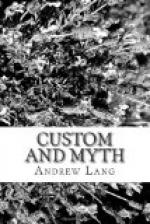It cannot be doubted that, at whatever period the Homeric poems took shape in Greece, they were believed to record the feats of the supposed ancestors of existing families. Thus, for example, Pisistratus, as a descendant of the Nelidae, had an interest in securing certain parts, at least, of the ‘Iliad’ and the ‘Odyssey’ from oblivion. The same family pride embellished and preserved the epic poetry of early France. There were in France but three heroic houses, or gestes; and three corresponding cycles of epopees. Now, in the ‘Kalevala,’ there is no trace of the influence of family feeling; it was no one’s peculiar care and pride to watch over the records of the fame of this or that hero. The poem begins with a cosmogony as wild as any Indian dream of creation; and the human characters who move in the story are shadowy inhabitants of no very definite lands, whom no family claim as their forefathers. The very want of this idea of family and aristocratic pride gives the ‘Kalevala’ a unique place among epics. It is emphatically an epic of the people, of that class whose life contains no element of progress, no break in continuity; which from age to age preserves, in solitude and close communion with nature, the earliest beliefs of grey antiquity. The Greek epic, on the other hand, has, as M. Preller {161} points out, ’nothing to do with natural man, but with an ideal world of heroes, with sons of the gods, with consecrated kings, heroes, elders, a kind of specific race of men. The people exist only as subsidiary to the great houses, as a mere background against which stand out the shining figures of heroes; as a race of beings fresh and rough from the hands of nature, with whom, and with whose concerns, the great houses and their bards have little concern.’ This feeling—so universal in Greece, and in the feudal countries of mediaeval Europe, that there are two kinds of men, the golden and the brazen race, as Plato would have called them—is absent, with all its results, in the ‘Kalevala.’
Among the Finns we find no trace of an aristocracy; there is scarcely a mention of kings, or priests; the heroes of the poem are really popular heroes, fishers, smiths, husbandmen, ‘medicine-men,’ or wizards; exaggerated shadows of the people, pursuing on a heroic scale, not war, but the common daily business of primitive and peaceful men. In recording their adventures, the ‘Kalevala,’ like the shield of Achilles, reflects all the life of a race, the feasts, the funerals, the rites of seed-time and harvest of marriage and death, the hymn, and the magical incantation. Were this all, the epic would only have the value of an exhaustive collection of the popular ballads which, as we have seen, are a poetical record of the intenser moments in the existence of unsophisticated tribes. But the ‘Kalevala’ is distinguished from such a collection, by presenting the ballads as they are produced by the events of a continuous narrative, and thus it takes a distinct place between the aristocratic epics of Greece, or of the Franks, and the scattered songs which have been collected in Scotland, Sweden, Denmark, Greece, and Italy.




